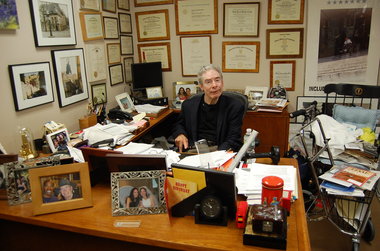 View full sizeStacey Baumgart of Clark tosses two balls tethered with string as part of her outpatient therapy at JFK Johnson Rehabilitation Institute in Edison. The institute has been named one of the nation's best.
View full sizeStacey Baumgart of Clark tosses two balls tethered with string as part of her outpatient therapy at JFK Johnson Rehabilitation Institute in Edison. The institute has been named one of the nation's best.EDISON – At first glance, "Independence Square" appears no different from any street corner in any town in Middlesex County.
The sidewalks are made of red brick and cement. The curbs are painted yellow where no parking is allowed. Street signs welcome visitors to Woodbridge and to Edison. An old Ford is parked near the center of town and a decorative streetlamp lights up everything.
Inside the nearby supermarket, shelves are stocked with boxes of Lucky Charms and cans of Del Monte green beens. Refrigerated cases are packed with frozen boxes of fish sticks and tacos. There’s fresh fruit in the produce aisle. And shoppers short on cash can use their debit card at an ATM machine nearby.
In spite of its appearance, Independence Square is no ordinary town.
The "town" is actually part of a recovery unit located inside the JFK Johnson Rehabilitation Institute at JFK Medical Center in Edison.
Those who come to visit or shop are the institute’s patients – people of all ages who come from across the state – are here to learn how to walk, shop and take care of themselves again. Most have suffered debilitating injuries after accidents or a life-threatening medical crisis like a heart attack or stroke.
“It’s a very emotional time when you have a disability,” said Marci Gietter, assistant administrator at JFK Johnson Rehabilitation Institute, which is attached to the medical center at 65 James St. in Edison. “We work with people from the time of their injury or disability until they can return to their highest level of function.”
 View full sizeMarci Gietter, assistant administrator at JFK Johnson Rehabilitation, shows off the facility's "supermarket."
View full sizeMarci Gietter, assistant administrator at JFK Johnson Rehabilitation, shows off the facility's "supermarket."For two consecutive years, the JFK Johnson Rehabilitation Institute has been named one of the one of the nation’s best by Rehab Management Magazine, in part due to its wide variety of in and outpatient physical therapy programs that help people recover from strokes, accidents and amputations.
Not so long ago, Stacy Baumgart of Clark suffered at devastating stroke at age 44 that left her unable to move her right leg.
Baumgart spent two weeks as an inpatient at the institute before her physical therapists determined she could come as an outpatient. “I’m better,” Clark said.
In day rehab, Baumgart last week tossed colored balls tethered with a string. The goal was to hook to the balls onto the bars in front of her. She needed minimal help from her physical therapist, Michele Dave, to complete the challenge.
After spending a couple of weeks as an inpatient learning to walk again, the same person – as an outpatient – may find herself in Independence Square.
“Our job is to challenge,” Gietter said. “Can you stand you stand? Can you stand and reach? Can you do the activities required in daily living?”
The not-for-profit institute, which opened in 1974, is part of the Robert Wood Johnson Medical School. The institute sees 300 new patients a month. Over the past 20 years, the institute has developed rehabilitation programs in the areas of stroke, brain injury, cardiac and orthopedics.
There are two satellite facilities, one in Metuchen with a pool and another in Monroe Township for outpatient therapy.
The institute differs from many others in New Jersey with its connection to JFK Medical Center, a 498-bed community hospital considered one of New Jersey's major health care facilities.
“We are so lucky in not being a standalone,” Gietter said. “Being attached to the hospital is a significant benefit to the patient. Should there be a complication or concern, their own physician can be nearby to continue to follow their patient” through rehab.
The JFK Johnson Rehabilitation Institute’s director is Dr. Thomas Strax, a graduate of New York University School of Medicine, who was born with cerebral palsy.
Strax, 70, is in a wheelchair. He has spent a total of 13 months over the past 12 years as a patient in the institute he runs.
“I understand what happens when you become a patient here,” Strax said. “You get a chance to see the good and the things that need to be tweaked.”
 View full sizeDr. Thomas Strax, who was born with cerebral palsy, is director of the institute.
View full sizeDr. Thomas Strax, who was born with cerebral palsy, is director of the institute.One recent change has been the addition of an ICARE machine, a type of elliptical machine that can help patients regain the ability to walk without help from therapists, which helps them get better much faster than the traditional treadmill method.
ICARE stands for Intelligently Controlled Assistive Rehabilitation Elliptical trainer. It’s a new machine that the center was able to obtain at a relatively low cost of $20,000, Gietter said.
Last week, John Ryan of Carteret, rode the machine as his physical therapist, Nordia hall, monitored him.
Ryan suffered a stroke not long ago and uses the machine to help him regain the ability to walk without help.
The institute’s Inpatient Rehabilitation Facility is also unique, providing patients with 24-hour nursing and physician availability. “Our IRF is the one of the most intensive settings for rehabilitation,” Gietter said.
The institute employs two psychologists who assess each patient for adjustment disorders and depression. “A man who has taken care of his family for his whole life and suddenly finds himself here is going to have some difficulty adjusting,” Gietter said. “We determine a (psychological) course of treatment based on the assessment of the team.”
Of the four departments at JFK Johnson Rehabilitation Institute, the brain injury unit has probably gained the most attention at a national level over the years.
HBO filmed its documentary “Coma” there in 2007. The feature-length film followed the recovery process of four patients who emerged from comas after suffering traumatic brain injuries.
Today the unit is locked and patients with all levels of brain injury are monitored for everything from changes in mood and behavior to physical problems like the inability to keep from falling out of bed. Treatment here is individualized and often based on how much a person with a brain injury can tolerate, Gietter said.
As an example, Gietter said some patients suffering from brain injury might be persuaded to work with weights by taking them to a setting that reminds them of their own gymnasium. Some therapy programs may consist of shooting basketball hoops or playing games that might be found at a family barbecue rather than rehab, she said.
“It’s all about finding that sweet spot for them,” Gietter said. “Helping them move onto their next step in rehabilitation.”
:
Hamilton hospital CEO says Robert Wood Johnson will continue to serve patients well


